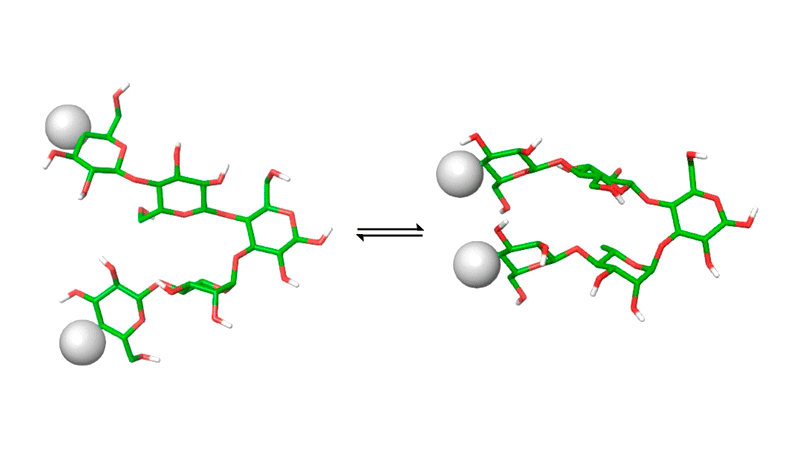
2025/04/29
CIC bioGUNE participates in an innovative study on the control of glycan folding through ionic groups
An international study, recently published in the Journal of the American Chemical Society (JACS), with the participation of CIC bioGUNE, demonstrates how glycan folding can be controlled through the incorporation of ionic groups.
The research shows that the introduction of ionic groups, such as carboxylates, sulfates, or amines, into glycans enables the stabilization of specific conformations and the modulation of their behavior through external stimuli like pH changes or enzyme presence.
These results open new opportunities in glycan engineering, with applications in biomedicine, smart drugs, and environmentally responsive materials.
An international study, recently published in the Journal of the American Chemical Society (JACS), led by the Max Planck Institute of Colloids and Interfaces and with the participation of researchers from CIC bioGUNE, member of BRTA, has revealed how it is possible to control glycan folding through the incorporation of ionic functional groups. The research was led by Dr. Martina Delbianco, in collaboration with researchers from the Chemical Glycobiology group at CIC bioGUNE, under the direction of Ikerbasque Research Professor Jesús Jiménez-Barbero.
Glycans are flexible molecules that can adopt multiple conformations, granting them significant biological versatility. However, this flexibility also poses a challenge for those trying to design stable and functional structures. The study presents an innovative strategy consisting of the controlled incorporation of ionic groups, such as carboxylates, sulphates, and amines, at specific positions within glycan sequences. This allows the stabilization of conformations, such as hairpin structures, and the reversible control of their behavior using external stimuli.
The work focused on designing and manipulating glycan sequences, which, when modified with ionic groups, can induce the formation of defined structures. Researchers demonstrated that these ionic functional groups enable the dynamic modulation of the glycan structure, promoting either opening or closing depending on factors such as pH changes or enzyme presence.
A key aspect of the research was the use of advanced nuclear magnetic resonance (NMR) spectroscopy techniques, which allowed in-depth study of the influence of ionic groups on the three-dimensional structure of glycans. The results showed that electrostatic interactions generated by the ionic groups can stabilize closed conformations through attraction, while repulsive forces favor open forms.
The study was structured around three main objectives. The first involved designing glycan sequences capable of adopting a hairpin conformation and manipulating their stability by incorporating different ionic groups. The second objective was to demonstrate how the interaction of these ionic groups with the environment allows the opening or closing of the glycan structure, enabling dynamic control of its conformation. Finally, the study investigated how external factors, such as pH variations or enzyme presence, can modify glycan structure and promote the formation of supramolecular materials.
The findings of this work provide new perspectives on using glycans as functional materials that can respond to external stimuli and change their conformation depending on the environment. This dynamic behavior opens the door to innovative applications, such as the development of smart drugs that switch between active and inactive states or the creation of glycan-based environmentally responsive materials.
Reference: Nishu Yadav, Ana Poveda, Yadiel Vázquez Mena, Martin Rosenthal, Yu Ogawa, Jesús Jiménez-Barbero, Martina Delbianco. Controlling Glycan Folding with Ionic Functional Groups. J. Am. Chem. Soc. DOI: 10.1021/jacs.4c17992.
About CIC bioGUNE
The Centre for Cooperative Research in Biosciences (CIC bioGUNE), member of the Basque Research & Technology Alliance (BRTA), located in the Bizkaia Technology Park, is a biomedical research organization conducting cutting-edge research at the interface between structural, chemical, molecular and cell biology, with a particular focus on generating knowledge on the molecular bases of disease, for use in the development of new diagnostic methods and advanced therapies.
About Ikerbasque
Ikerbasque - Basque Foundation for Science - is the result of an initiative of the Department of Education of the Basque Government that aims to reinforce the commitment to scientific research by attracting, recovering and consolidating excellent researchers from all over the world. Currently, it is a consolidated organization that has over 350 researchers/s, who develop their work in all fields of knowledge.
About BRTA
BRTA is an alliance of 4 collaborative research centres (CIC bioGUNE, CIC nanoGUNE, CIC biomaGUNE y CIC energiGUNE) and 13 technology centres (Azterlan, Azti, Ceit, Cidetec, Gaiker, Ideko, Ikerlan, Leartiker, Lortek, Neiker, Tecnalia, Tekniker y Vicomtech) with the main objective of developing advanced technological solutions for the Basque corporate fabric.
With the support of the Basque Government, the SPRI Group and the Provincial Councils of the three territories, the alliance seeks to promote collaboration between the research centres, strengthen the conditions to generate and transfer knowledge to companies, contributing to their competitiveness and outspreading the Basque scientific-technological capacity abroad.
BRTA has a workforce of over 4,000 professionals, executes 22% of the Basque Country's R&D investment, registers an annual turnover of more than 300 million euros and generates 100 European and international patents per year.
See a large version of the first picture





